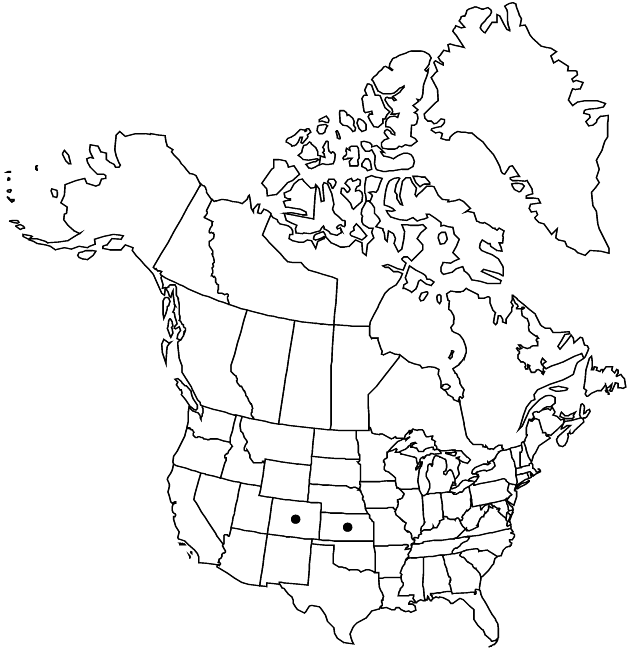Oönopsis engelmannii
Pittonia 3: 45. 1896.
Common names: Engelmann’s goldenweed
Basionym: Bigelowia engelmannii A. Gray Proc. Amer. Acad. Arts 11: 75. 1876 (as Bigelovia engelmanni)
Synonyms: Haplopappus engelmannii (A. Gray) H. M. Hall
Revision as of 18:45, 24 September 2019 by FNA>Volume Importer
Plants 6–30 cm. Stems glabrous or scabrous. Leaf blades linear to linear-oblanceolate, (5–)10–80(–95) × 0.7–2.6(–3) mm, cauline bases not auriculate or clasping, distalmost cauline abruptly reduced. Heads not immediately subtended by leaflike bracts. Involucres 7–11.5(–13) mm. Phyllary apices abruptly acute to obtuse, apiculate to cuspidate. Ray florets 0. Disc florets 7–28. Cypselae 5–6 mm, faces glabrous or sparsely scabrous. 2n = 20.
Phenology: Flowering Jul–Sep.
Habitat: Barrens, limestone and clay outcrops and ridges, sandy or gravelly slopes, shaley slopes (often with Frasera coloradensis), cactus-scrub, dry powdery clay, gypsiferous shale, ditches, pastures, fencelines, drying shorelines, usually in sites within shortgrass prairie
Elevation: 1200–1900 m
Discussion
Oönopsis engelmannii grows in Baca, Bent, Cheyenne, Denver, El Paso, Elbert, Kiowa, and Lincoln counties in Colorado, and in Hamilton County, Kansas. Hybrids are documented between O. engelmannii and O. foliosa var. foliosa.
Selected References
None.
Lower Taxa
None.
... more about "Oönopsis engelmannii"
Engelmann’s goldenweed +
Barrens, limestone and clay outcrops and r … Barrens, limestone and clay outcrops and ridges, sandy or gravelly slopes, shaley slopes (often with Frasera coloradensis), cactus-scrub, dry powdery clay, gypsiferous shale, ditches, pastures, fencelines, drying shorelines, usually in sites within shortgrass prairieusually in sites within shortgrass prairie +
Pittonia +
1896 +
Oönopsis engelmannii +
Oönopsis +
species +
